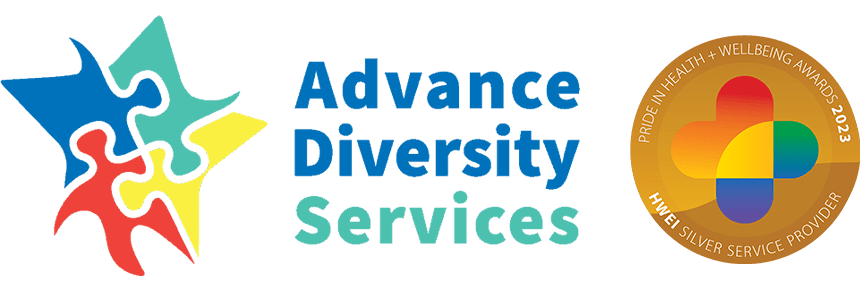Loc Nguyen from ACON worked closely with James Sabbagh during his student work placement with Advance Diversity Services (ADS) to expand and update the Multicultural LGBTIQA+ Support Directory.
The directory incorporates a vast array of counselling services, legal support, faith communities, media services, university groups, aged care, youth services, professional associations and more in the Sydney area.
It’s also a useful referral tool for social workers, case workers and organisations who work with CALD LGBTIQA+ people who are migrants or the children of migrants, refugees, asylum-seekers, stateless or internally displaced.
Loc and James brought the combined weight of their networking, coordination, research and editing skills to the exacting task of ensuring the new edition of the directory is user friendly and up-to-date.
Both say the new version is a vital resource for a CALD LGBTIQA+ person to find services and groups that can support their wellbeing.

On the heels of its launch, Loc explains why …
Why is it crucial to continue to produce the directory and promote the accessibility of the services and groups, which exist to support the wellbeing of the CALD LGBTIQA+ community?
Many mainstream services and programs provide support to community members assuming that they either belong to the LGBTQ+ community or to a cultural group, and rarely do we see programs that meet the intersectional needs of those belonging to both or more groups.
For LGBTQ+ community members from culturally, linguistically and ethnically diverse backgrounds, it is important that they are able to see themselves in community groups and services that holistically and meaningfully understand their experiences of culture, gender and sexuality. This is even more important for those with migrant or refugee experience who are looking to build their social connections with peers in Australia.
The directory will support the social wellbeing of LGBTQ+ community members from culturally, linguistically and ethnically diverse backgrounds to get connected with the right community groups and services that are culturally safe and relevant to their needs and experiences.
What feedback have ACON, ADS and others had from users about previous versions of the directory?
Overall, feedback has been really positive for the resource with many community members expressing it has made it easier for them to find relevant community groups to get connected with. Service providers have also shared how useful the resource has been when referring LGBTQ+ community members from culturally and linguistically diverse backgrounds to other services.
However, we have also received feedback that certain LGBTQ cultural groups have not been represented in this resource in the past. The beauty of the directory and website being updated frequently is that we can continue to expand and include groups that have been missing so that we can support as many community members when looking to the future.
What barriers can CALD LGBTIQA+ people face in finding the support they need, which could well be overcome by using the information provided in the directory?
Studies have shown that LGBTQ+ people from culturally, linguistically and ethnically diverse backgrounds and those with migrant and refugee experience are disproportionately faced with multiple forms of marginalisation in social and health settings. This includes racism, xenophobia, homophobia and transphobia.
This leads to poorer physical, social and mental health outcomes for these communities as well as reduced access to mainstream health services, which community members may not perceive to be for them if the service is seen to be for white or non-LGBTQ people.
However, evidence from studies shows that when LGBTQ+ community members from culturally, linguistically and ethnically diverse backgrounds are connected to their peers, there is an increase in confidence when accessing to health services.
This directory links LGBTQ+ people from culturally, linguistically and ethnically diverse, migrant and refugee backgrounds, and LGBTQ+ people of colour into services and community groups that provide culturally safe and appropriate support that are specific to the diverse needs of community members, which is crucial to overcoming these social barriers and to improving health outcomes and literacy for these communities.
Why is the directory website at https://www.rainbowcultures.org.au/ so useful?
Rainbow Cultures is an online directory that expands on the physical Multicultural LGBTQIA+ Support Directory. This website was developed through a combined effort by ACON and community groups, SocialisAsians and ANTRA, with support from Advance Diversity Services and CALD Gay Men’s Action Group.
Being online, Rainbow Cultures is much more accessible to community members, and is potentially more shareable amongst peers. As a digital resource, the website also continues to be expanded and updated with the latest information around the multicultural LGBTQ+ community groups in NSW. This became even more important during the COVID-19 pandemic lockdowns when community members were looking to stay connected with their peers through online events. We hope moving forward the website can house further resources for multicultural LGBTQ+ community members.
What was it like to work with James on the directory and where can people find the print version?
James was great. He brought his Social Worker training to the job and surveyed LGBTIQA+ groups and individuals – the feedback from which helped us to shape this edition. There’s a web viewable version of the directory here. Advance Diversity Services will also have a limited supply of printed copies, which people can get by contacting info@advancediversity.org.au and pick-up from its Hurstville office.
_____
Loc Nguyen is Community Health Promotion Officer – Multicultural Engagement and Community Development for ACON.
James Sabbagh completed his six-month student work placement with ADS in January 2022 as part of his Social Work honours degree at the University of Wollongong. He commenced his new role as Social Worker at Sutherland Hospital in early February.
